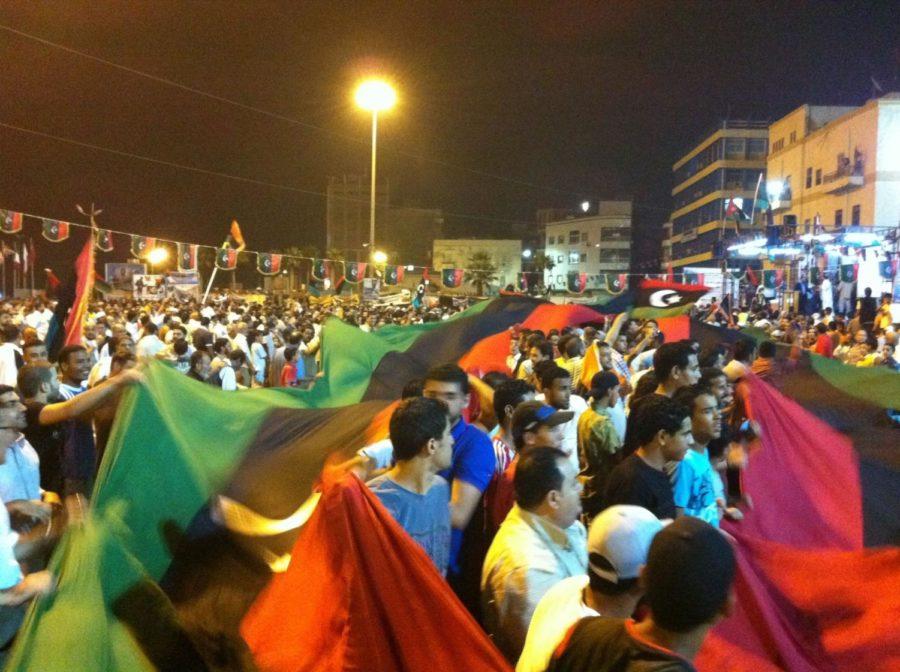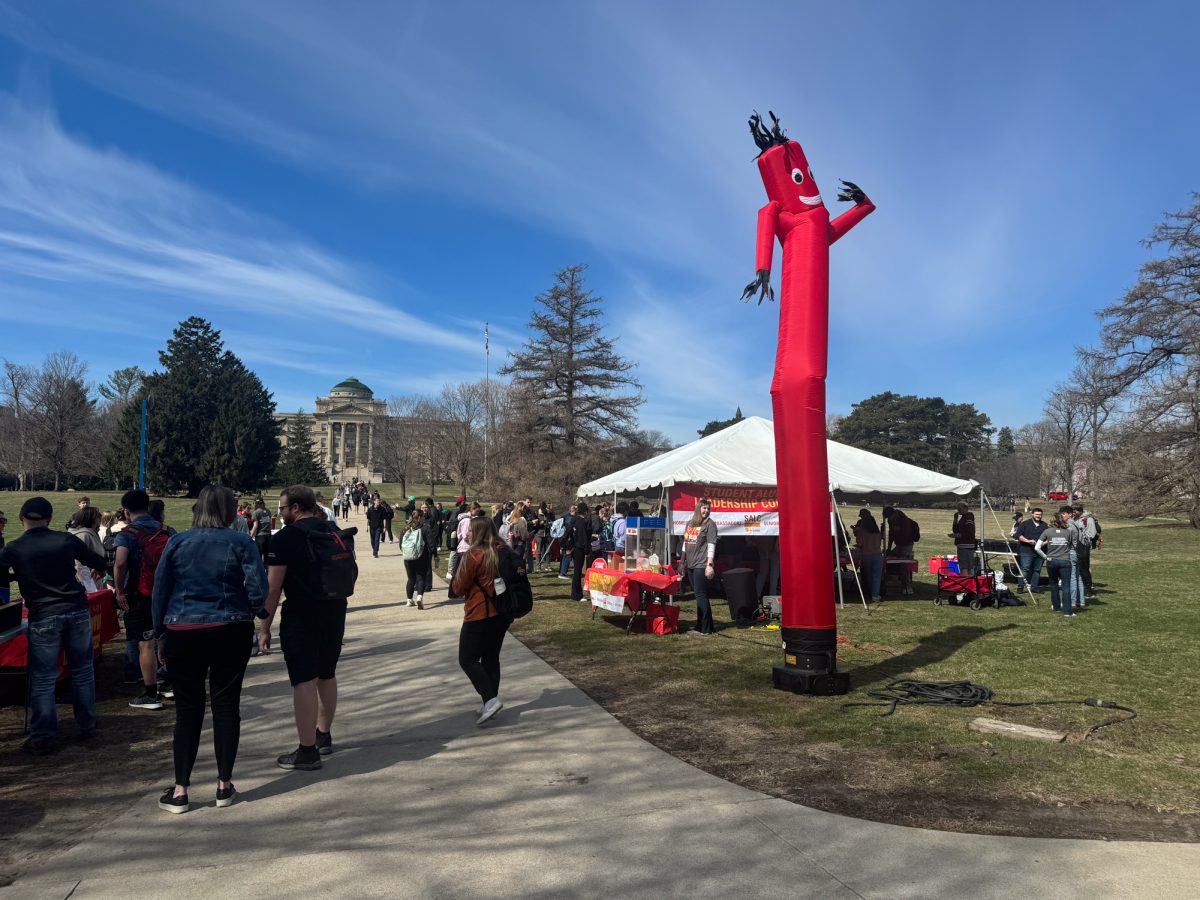Where is Gadhafi and how long can he hold out?
Sammi Addahoumi shot this picture this morning of Libyans in Benghazi celebrating the crumbling of Muammar Gadhafi’s regime. ‘The people want to go to Tripoli,’ he said. ‘Not to fight, simply just to witness free Tripoli.’
August 24, 2011
Tripoli may fall; the Libyan regime, collapse. But the rebels say they will not rest until Moammar Gadhafi is captured or killed.
How long they will have to wait for that moment of victory remains as uncertain as ever.
The strongman they are hunting is known to be eccentric, mercurial and, judging from his actions, often disconnected with reality, making it all that more difficult to predict his moves, said John Burns, a New York Times journalist who recently reported from Tripoli.
“It’s a mystery,” Burns said. “We are all speculating. And we are all speculating about an unpredictable man.”
The rebel takeover of Tripoli and most notably, Gadhafi’s compound, brought celebratory gunfire and street jubilation that evoked memories of another Arab capital more than seven years ago: Baghdad.
In 2003, Iraqi dictator Saddam Hussein, just like Gadhafi, had vowed to stand with his people. But in the end, both vanished from sight.
Hussein managed to elude capture for eight months after his fall and was eventually discovered hiding in a hole in the ground by U.S. soldiers.
Burns, who covered Hussein and the Iraq war extensively, called both men “killers,” but said Hussein was much more calculating. He said Gadhafi was missing an element of rationality.
“The concept that the game is up may not apply with the same kind of rigor and rationality as it might in others,” Burns said. “That suggests a propensity for a last-ditch Alamo situation.
“I think he has been delusional for quite a few years and becomes more delusional as this endgame for him develops,” Burns said.
At the moment, conjecture trumps evidence as to Gadhafi’s whereabouts and how long he will be able to evade rebel fighters.
CNN’s Nic Robertson, who also covered the fall of Hussein, said Gadhafi’s time is limited and that he would not hold out as long as Hussein did.
Unlike Iraq, where Hussein was overthrown by international forces, a popular uprising led to Gadhafi’s predicament. Hussein, said Burns, also found an obvious refuge in what became a sectarian divide in Iraq. Gadhafi does not have that option.
“Most of the country wants him gone,” Robertson said. “But even so, it could be weeks.”
Former Gadhafi aide Abubaker Saad described a network of bunkers under the Gadhafi compound that could serve as a hideout. But the bunkers have been targets of NATO bombings and it’s unlikely Gadhafi would remain there.
Others have suggested that he is hiding in a farm near the airport, waiting to escape. That theory gained ground after a purported Gadhafi audio message aired Wednesday that seemed to have the sound of a squawking chicken in the background.
But Gadhafi has a fear of flying over water and an intense dislike of staying in the upper floors of buildings, according to U.S. diplomatic cables released last year by the anti-secrecy website WikiLeaks. So he could instead try to flee by ship from the port.
There has also been talk that Gadhafi may be accepted in another country — Venezuela, Chad and Algeria are possibilities.
“He could be at the Algerian border,” said Fouad Ajami, a senior fellow at Stanford University’s Hoover Institution. “Take a look at the neighborhood of this new Libya, free Libya, which is what it is, a free Libya. It has favorable borders — Tunisia on one side, Egypt on the other, but the Algerians are committed to Moammar Gadhafi.
“He has options,” Ajami said. “He could go to Chad where he paid tons of money to the rulers there. I think he is a hunted man. We should see him for what he is, a fugitive from Libyan justice and international justice.”
Charles O. Cecil, a former U.S. ambassador to Niger who served as charge d’affaires in Libya from 2006 to 2007, said several African nations may feel beholden to Gadhafi for the aid he has given them. Gadhafi even helped negotiate a peace accord in the Central African Republic.
But given Gadhafi’s personality, Cecil was inclined to believe that Gadhafi would remain true to his vow and remain on Libyan soil. Cecil said Gadhafi might find relief in his native Sirte, surrounded by members of his own tribe, the people who have benefited most from his rule.
That’s what Hussein did in Iraq. He escaped to his hometown of Tikrit and survived for many months.
“I am wondering how he [Gadhafi] would get there,” Cecil said, referring to rebel control of the roads leading to Sirte. “He would almost have to fly.”
The head of the World Chess Federation told Russia’s Interfax news agency that he spoke by telephone with Gadhafi Tuesday. Kirsan Ilyumzhinov said Gadhafi was “alive and well in Tripoli and not going to leave Libya.”
Ilyumzhinov had traveled to Libya to promote chess in schools in June. Burns, the New York Times reporter, took note of Gadhafi’s chess match with the Russian visitor unfolding amid NATO bombardment as another example of Gadhafi’s delusion.
But perhaps, given the chess match, the Russian knew the truth this week about the Libyan dictator’s whereabouts.
“That’s more like his personality,” Cecil said. “He would choose to be in his own eyes a martyr.”
Cecil quoted Welsh poet Dylan Thomas in describing the man who has ruled Libya for more than four decades.
“Do not go gentle into that good night,
Old age should burn and rage at close of day;
Rage, rage against the dying of the light.”







